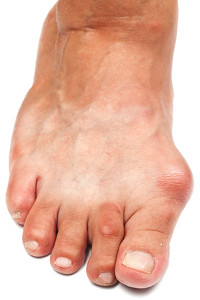 Bunions are typically the result of a bone deformity that affects the toes. The big toe typically leans toward the second toe, and this may cause a bump to form on the bottom of the big toe. Fluid may develop in the surrounding joint, in addition to the skin becoming thickened. This is often a painful condition, and as a result other ailments such as arthritis may develop. Research has shown that it’s beneficial to wear proper shoes that can accommodate the bunion and possibly diminish the pain and discomfort. Relief options may include using adequate padding over the bunion for protection, and wearing shoes that can adjust to the width of your foot. For bunions that have become extremely painful and unmanageable, surgery may be an option to consider. It’s suggested to schedule a consultation with a podiatrist to learn about the best treatment options for you.
Bunions are typically the result of a bone deformity that affects the toes. The big toe typically leans toward the second toe, and this may cause a bump to form on the bottom of the big toe. Fluid may develop in the surrounding joint, in addition to the skin becoming thickened. This is often a painful condition, and as a result other ailments such as arthritis may develop. Research has shown that it’s beneficial to wear proper shoes that can accommodate the bunion and possibly diminish the pain and discomfort. Relief options may include using adequate padding over the bunion for protection, and wearing shoes that can adjust to the width of your foot. For bunions that have become extremely painful and unmanageable, surgery may be an option to consider. It’s suggested to schedule a consultation with a podiatrist to learn about the best treatment options for you.
If you are suffering from bunion pain, contact Donald Manger, DPM of Associated Podiatric Physicians, PA. Our doctor can provide the care you need to keep you pain-free and on your feet.
What Is a Bunion?
Bunions are painful bony bumps that usually develop on the inside of the foot at the joint of the big toe. As the deformity increases over time, it may become painful to walk and wear shoes. Women are more likely to exacerbate existing bunions since they often wear tight, narrow shoes that shift their toes together. Bunion pain can be relieved by wearing wider shoes with enough room for the toes.
Causes
- Genetics – some people inherit feet that are more prone to bunion development
- Inflammatory Conditions - rheumatoid arthritis and polio may cause bunion development
Symptoms
- Redness and inflammation
- Pain and tenderness
- Callus or corns on the bump
- Restricted motion in the big toe
In order to diagnose your bunion, your podiatrist may ask about your medical history, symptoms, and general health. Your doctor might also order an x-ray to take a closer look at your feet. Nonsurgical treatment options include orthotics, padding, icing, changes in footwear, and medication. If nonsurgical treatments don’t alleviate your bunion pain, surgery may be necessary.
If you have any questions, please feel free to contact our office located in Hamilton Township, NJ . We offer the newest diagnostic and treatment technologies for all your foot care needs.
